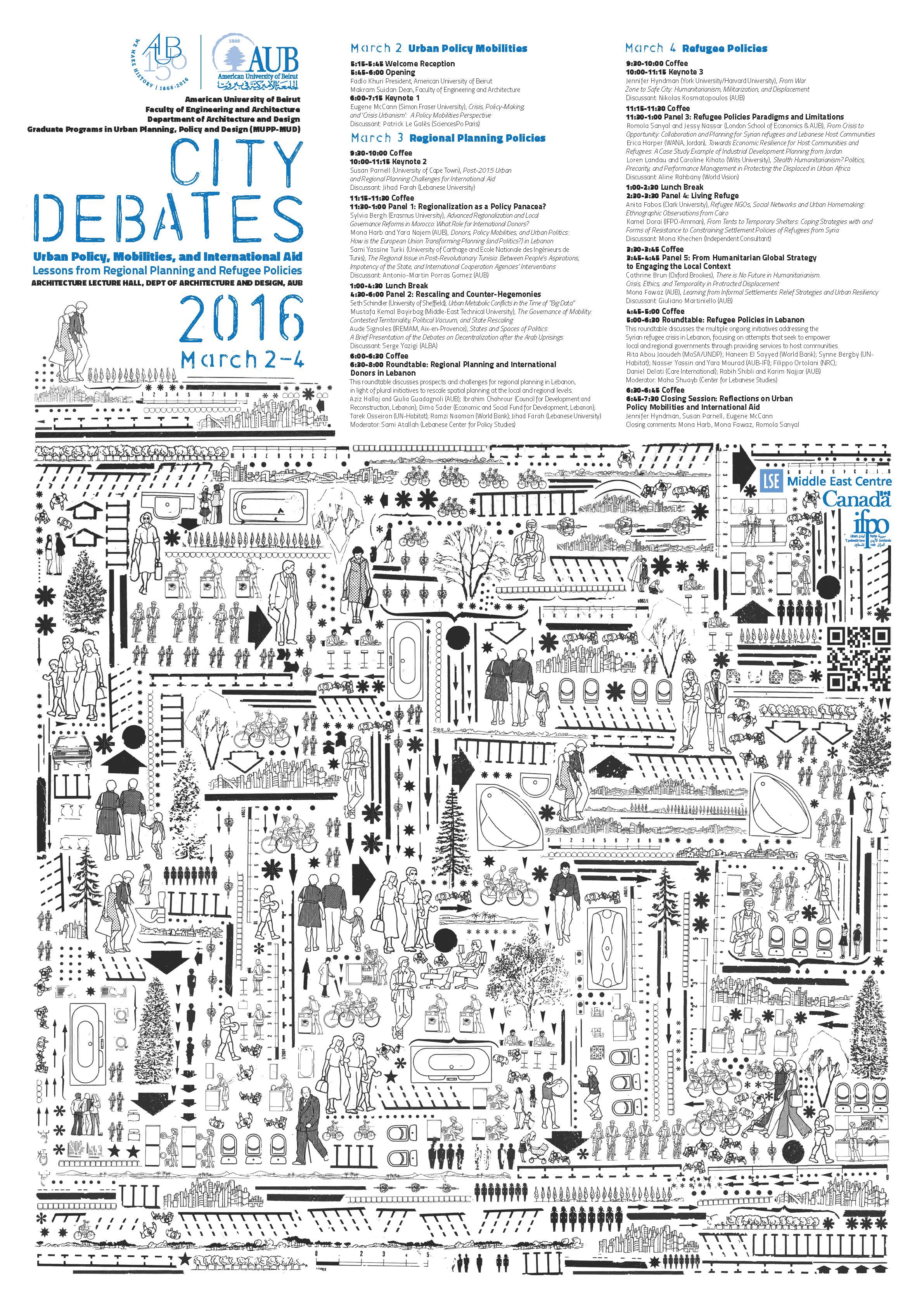The yearly City Debates conference is organized by the graduate programs in Urban Planning, Policy and Design (MUPP-MUD) at the American University of Beirut. This year`s City Debates stems from a relational and multi-scalar understanding of urban policy as an assemblage of ideas and tools that circulate and transform. It seeks to examine how international aid promotes the mobility of urban policy ideas, and mobilizes a range of stakeholders, and technologies in the process. City Debates 2016 explores these questions by investigating two sets of urban policies: regional planning, and refugee policies. How is international aid promoting state rescaling, and an approach to urban planning which is decentralized, territorial, or regional? How is humanitarian aid conceiving refugee policies, and to what extent is it able to conceive them in dialogue with the local and urban scales, rather than generically? By analyzing case studies from across the world, with a focus on the Middle East region, City Debates contributes to critical reflection, and informed practice related to regional planning, and refugee-ness. The Debates also highlight the social and political opportunities that international aid may produce, when conceived in relation to inclusive urban and local governance dynamics, and when embedded in flexible institutional configurations that prioritize livability.
City Debates 2016 program can be found below. For more information on speakers and topics of discussion, check City Debates website, and Facebook page. This is a public event, no need for registration.
[City Debates 2016 is generously supported by a grant from the Middle East Centre at the LSE, as well as by the Faculty of Engineering and Architecture at AUB, the Issam Faris Institute for Public Policy and International Affairs at AUB, the Institut Francais du Proche-Orient (IFPO), and The Embassy of Canada in Lebanon. City Debates 2016 is also an AUB 150th anniversary event.]

[Poster design by Jana Traboulsi and Sarah Abou-Abadallah]
City Debates 2016: Urban Policy Mobilities and International Aid
Lessons from Regional Planning and Refugee Policies
2-4 March
Program:
Wednesday 2 March: Urban Policy Mobilities
5:15-5:45 Welcome Reception
5:45-6:00 Opening
Fadlo Khuri, President, American University of Beirut
Makram Suidan, Dean, Faculty of Engineering and Architecture
Mona Harb, Professor of Urban Studies and Politics, AUB
6:00-7:15 Keynote 1
Eugene McCann, Simon Fraser University: Crisis, Policy-Making, and ‘Crisis Urbanism’: A Policy Mobilities Perspective
> Discussant: Patrick Le Galès, Science Po Paris
Thursday 3 March: Regional Planning Policies
9:30-10:00 Coffee
10:00-11:15 Keynote 2
Susan Parnell, University of Cape Town: Post-2015 Urban and Regional Planning Challenges for International Aid
> Discussant: Jihad Farah, Lebanese University
11:15-11:30 Coffee
11:30-1:00 Panel 1: Regionalization as a Policy Panacea?
Sylvia Bergh, Erasmus University: Advanced Regionalization and Local Governance Reforms in Morocco: What Role for International Donors?
Mona Harb and Yara Najem, American University of Beirut: Donors, Policy Mobilities, and Urban Politics: How is the European Union Transforming Planning (and Politics?) in Lebanon
Sami Yassine Turki, University of Carthage, and Ecole Nationale des Ingénieurs de Tunis: The Regional Issue in Post-Revolutionary Tunisia: Between People’s Aspirations, Impotency of the State, and International Cooperation Agencies’ Interventions
> Discussant: Antonio-Martin Porras Gomez, AUB
1:00-4:30 Lunch Break
4:30-6:00 Panel 2: Rescaling and Counter-Hegemonies
Seth Schindler, University of Sheffield: Urban Metabolic Conflicts in the Time of “Big Data”
Mustafa Kemal Bayirbag, Middle-East Technical University: The Governance of Mobility: Contested Territoriality, Political Vacuum, and State Rescaling
Aude Signoles, IREMAM, Aix-en-Provence: States and Spaces of Politics: A Brief Presentation of the Debates on Decentralization after the Arab Uprisings
> Discussant: Serge Yazigi, ALBA
6:00-6:30 Coffee
6:30-8:00 Roundtable: Regional Planning and International Donors in Lebanon
This roundtable discusses prospects and challenges for regional planning in Lebanon, in light of plural initiatives to rescale spatial planning at the local and regional levels.
Aziz Hallaj and Giulia Guadagnoli (AUB); Ibrahim Chahrour (Council for Development and Reconstruction, Lebanon); Dima Sader (Economic and Social Fund for Development, Lebanon); Tarek Osseiran (UN-Habitat); Ramzi Naaman (World Bank); Jihad Farah (Lebanese University)
> Moderator: Sami Atallah, Lebanese Center for Policy Studies (LCPS)
Friday 4 March: Refugee Policies
9:30-10:00 Coffee
10:00-11:15 Keynote 3
Jennifer Hyndman, York University/Harvard University: From War Zone to Safe City: Humanitarianism, Militarization, and Displacement
> Discussant: Nikolas Kosmatopoulos, AUB
11:15-11:30 Coffee
11:30-1:00 Panel 3: Refugee Policies Paradigms and Limitations
Romola Sanyal and Jessy Nassar, London School of Economics & AUB: From Crisis to Opportunity: Collaboration and Planning for Syrian refugees and Lebanese Host Communities
Erica Harper, WANA, Jordan: Towards Economic Resilience for Host Communities and Refugees: A Case Study Example of Industrial Development Planning from Jordan
Loren Landau and Caroline Kihato, Wits University: Stealth Humanitarianism? Politics, Precarity, and Performance Management in Protecting the Displaced in Urban Africa
> Discussant: Aline Rahbany, World Vision
1:00-2:30 Lunch Break
2:30-3:30 Panel 4: Living Refuge
Anita Fabos, Clark University: Refugee NGOs, Social Networks and Urban Homemaking: Ethnographic Observations from Cairo
Kamel Dorai, IFPO-Amman: From Tents to Temporary Shelters: Coping Strategies with and Forms of Resistance to Constraining Settlement Policies of Refugees from Syria
> Discussant: Mona Kheshen, Independent Consultant
3:30-3:45 Coffee
3:45-4:45 Panel 5: From Humanitarian Global Strategy to Engaging the Local Context
Cathrine Brun, Oxford Brookes: There is No Future in Humanitarianism. Crisis, Ethics, and Temporality in Protracted Displacement
Mona Fawaz, American University of Beirut: Learning from Informal Settlements: Relief Strategies and Urban Resiliency
> Discussant: Giuliano Martiniello, AUB
4:45-5:00 Coffee
5:00-6:30 Roundtable: Refugee Policies in Lebanon
This roundtable discusses the multiple ongoing initiatives addressing the Syrian refugee crisis in Lebanon, focusing on attempts that seek to empower local and regional governments through providing services to host communities.
Rita Abou-Jaoudeh (MoSA/UNDP); Haneen El Sayyed (World Bank); Synne Bergby (UN-Habitat); Nasser Yassin and Yara Mrad (AUB-IFI); Filippo Ortolani (NRC); Daniel Delati (Care International); Rabih Shibli and Karim Najjar (AUB-CCECS, ArD)
> Moderator: Maha Shuayb, Center for Lebanese Studies
6:30-6:45 Coffee
6:45-7:30 Closing Session: Reflections on Urban Policy Mobilities and International Aid
Jennifer Hyndman, Susan Parnell, Eugene McCann
> Closing comments: Mona Harb, Mona Fawaz, Romola Sanyal